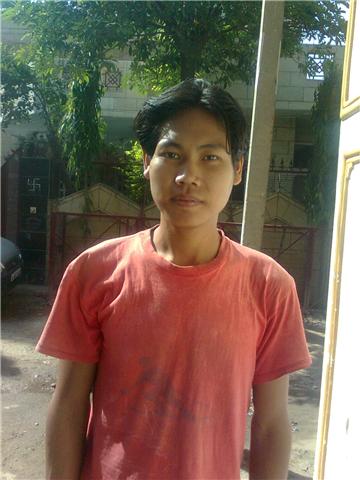YOUNG BURMESE STILL FORCED INTO MILITARY SERVICE
New Delhi- The winter breeze, mingled with the fragrance of nearby pine trees, was affectionately teasing the flashy face of a young school boy, who strolled along the five-mile long asphalt road winding through the forest which lied between his school and his home in a small village called Doegwin. It is near Pin Oo Lwin, a famous hill station northeast of Mandalay, Burma’s second largest city.
Along the way, he came across two men in Khaki uniforms, carrying guns at around 8:00 am, in November, 2001.
 The school boy known as Thang Thang, son of Van Thlang, did not reach his school that day. He has not been there since.
The school boy known as Thang Thang, son of Van Thlang, did not reach his school that day. He has not been there since.
“They pointed the guns at me. First, they asked me to join the army,” Thang Thang said in a recent interview.
“When I refused, they kicked me and hit me in the back with gun barrels five times. Finally, they handcuffed me and pushed me into a car.”
Thang Thang, was 16 years old when he was hijacked by military recruitment personnel. Before that, he was a student in Class VIII at the High School in Anisakhan, near Pin Oo Lwin.
He said he dreamed of being a professional agriculturist someday, but, ended up in a military training camp in Monywa Township, Sagaing Division, under the northwestern command.
“I felt like my entire dream was shattered in pieces on the floor. So, I cried. But, that solved nothing,” he said.
Like Thang Thang, two other under age kids, Htun Htun and his cousin Win Win, from a remote area in Pegu, north of the former capital, Rangoon, were forcibly recruited by two men in khaki uniforms one night last year. They were asleep at midnight in a railway station in Rangoon.
They grew up in a small village called Kayinchaung, in Moe Nyo Township in Pegu, where they quit school early because their parents, hand-to-mouth laborers, could not afford to pay their school fees any more. He and his cousin left home to look for jobs in Rangoon.
“They got waiter jobs in a small teashop, but, were paid low wages. So, they decided to turn back home after 6 days working,” Ba Ni, Htun’s father said, adding that they planned to return home when they were picked up by military personnel at the railway station.
At that time Htun was 16 and his cousin was 17.
“The two soldiers persuaded them that they would have a well paid job in the army. However, when the boys refused to join the army, they kicked them, beat them and hit them with the gun barrels. Then they took them away to military recruitment camp,” Ba Ni said.
Incidents like this are not unusual in military ruled Burma according to some International Non-governmental Organizations (INGOs), which have reported about 60,000 under age children, as young as 11, were forcibly recruited into the Burmese Army and about 7,000 into Burmese ethnic rebel groups.
The recruitment and use of under age children by the Burmese regime to increase military strength has drawn the attention of the international community and the U.N.
In August, the United Nations Security Council (UNSC) called on all governments, including Burma, to comply strictly with international laws calling for the protection of children in armed conflicts, including the convention on the Rights of the Child and its Optional Protocol on the involvement of Children in armed conflict.
The Optional Protocol to the Convention on the Rights of the Child requires states to set a minimum age of 18 for compulsory recruitment and participation in hostilities and to raise the minimum age for voluntary recruitment from that set out in article 38, paragraph 3, of the Convention on the Rights of the Child.
Despite the insistence of the UNSC, Aung Myo Min, director of the Thailand-based Human Rights Education Institute of Burma (HREIB), recently told Mizzima that there has been no significant decrease in the use of children in the Burmese Army and rebel groups.
“There is no sign of decreased use of under age children in the Burmese Army, but, the recruitment is still going on,” Aung Myo Min said.
Thang Thang said he saw over one thousand recruited under age children, some as young as 12, in No (8) military training camp, in Monywa, where he undertook arms training.
“The guns we held were taller than us. The uniforms and boots we wore did not fit. So, they ordered new uniforms and boots for us,” he remembered about the training camp.
“The training was unbearable,” he said. “The sun was too hot and we were thirsty for water during the training.”
He added, “If we took a rest, we were beaten by trainers.”
He said some children did manage to escape from the unbearable hardship they endured, during the training.
Two hundred and fifty children began training in his group. But, only 180 children were left after the training was completed.
Unfortunately, some were recaptured.
“The recaptured kids were beaten and locked up. They cried. The more they cried, the more severely they were beaten,” he said.
 Similarly, Htun and his cousin were sent to a military training school in Phawn Kyi in Rangoon division after they were picked up by military recruiters and received training for four months.
Similarly, Htun and his cousin were sent to a military training school in Phawn Kyi in Rangoon division after they were picked up by military recruiters and received training for four months.
However, after serving in the army for sometime at a base in Thanlyin Township, in Rangoon, Htun and his cousin returned home, while on 10-day leave. But, they never returned to the army.
Ba Ni said his son told him about the abuse they received while being trained.
“They had been tortured during the training. They were sometime beaten. So they did not want to go back,” Ba Ni said.
In his report submitted to UN Security Council (UNSC) in June, United Nation’s General Secretary, Ban Ki-mon, said the UN’s country task force on Burma has received numerous reliable reports on the recruitment and use of children in the Burmese Army and ethnic rebel groups, including cease-fire groups.
However, Ban Ki-moon said UN agencies and its partners are unable to effectively monitor the “grave violations” perpetrated against children by the Burmese Army and armed resistant groups because of the absence of an agreed upon action plan, lack of access and security impediments.
“The severe restriction of access by the government to locations of concern continues to limit the ability of the country task force and its partners to monitor and report on grave violations being perpetrated against children by all parties to the conflict, despite the fact that the basic structures of the monitoring and reporting mechanism have been in place since February 2007,” the Secretary General said in his report.
Steve Marshall, Liaison Officer for the International Labor Organization (ILO) in Rangoon, recently told Mizzima that over the past two years the ILO has been involved in the UN’s country task force and has received approximately 60 complaints from concerned relatives of underage children. Only a few have been reunited with their families.
Despite this, the Burmese military junta has said it has cooperated with UN country task force on the protection of children in situations of armed conflict, including their recruitment and use.
Contrary to the claims of the regime, Htun and his cousin were arrested by a policeman at home in August this year and charged with deserting from the army. He is currently being detained in Hlaw Kaar military prison in Shwepyitar town, in Rangoon, while Win was sent to military driving school in Monywa.
“I feel our time was so short. We have not had enough time to enjoy together,” Htun’s father said
“The worse is his mother cries for her son every night.”
The journey of Htun and his cousin was different from Thang Thang. After spending over three years in army, he was posted to Kalay and Khanti, in Sagaing division, to patrol the front line in Naga hill, in northwestern Burma.
Eventually, he escaped to India from military camp No (2) Tactical Command, while stationed in Matupi, southern Chin state, in western Burma.
“I won’t go back home until democracy and human rights are fully restored in the country [Burma],” Thang Thang said.
Note: The names of Characters in this story were changed for the sake of their security.



